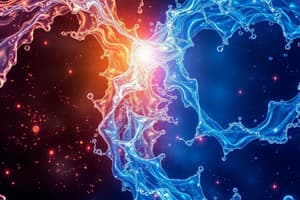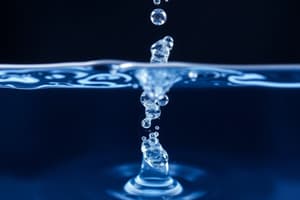Podcast
Questions and Answers
Why is water considered a polar molecule?
Why is water considered a polar molecule?
Water is a polar molecule because of its shape, having one negatively charged oxygen and two positively charged hydrogen atoms, leading to unequal sharing of electrons.
Why does water form hydrogen bonds with itself and other charged molecules?
Why does water form hydrogen bonds with itself and other charged molecules?
Water forms hydrogen bonds because it is a polar molecule and can attract other charged, polar molecules.
What is a hydrogen bond and what effect does it have on water's behavior?
What is a hydrogen bond and what effect does it have on water's behavior?
A hydrogen bond is an attraction between a negatively charged molecule and hydrogen molecules from other molecules, causing cohesion and adhesion.
Cohesion is when water molecules stick together, while ______ is when water molecules stick to other items.
Cohesion is when water molecules stick together, while ______ is when water molecules stick to other items.
What makes water a good solvent?
What makes water a good solvent?
How does water change temperature slowly?
How does water change temperature slowly?
Why is water buoyant in its solid form?
Why is water buoyant in its solid form?
Flashcards are hidden until you start studying
Study Notes
Water as a Polar Molecule
- Water's polarity arises from its bent shape and the difference in electronegativity between oxygen (negative) and hydrogen (positive) atoms.
- Polarity leads to unequal sharing of electrons, resulting in a dipole moment within the water molecule.
Hydrogen Bonding in Water
- Water molecules form hydrogen bonds due to their polar nature, enabling attraction to other charged or polar molecules.
- The strength of hydrogen bonds facilitates significant inter-molecular interactions, affecting water's properties.
Cohesion and Adhesion
- Cohesion refers to the attraction between water molecules, causing them to stick together; this is crucial for water's movement in plants and surface tension.
- Adhesion is the attraction between water molecules and other substances, allowing water to climb surfaces and contribute to capillary action.
Water as a Solvent
- Water is an excellent solvent for charged or polar substances, due to its polar nature, enhancing chemical reactions and biological processes.
Temperature Regulation
- Water changes temperature slowly because hydrogen bonds form when it cools and break when it heats up, providing stable environmental temperatures.
Density of Ice
- Ice is less dense than liquid water because lower temperatures preserve hydrogen bonding structures, creating a crystalline form that occupies more space.
- This property allows ice to float, creating an insulating layer on bodies of water, protecting aquatic life beneath.
Studying That Suits You
Use AI to generate personalized quizzes and flashcards to suit your learning preferences.




